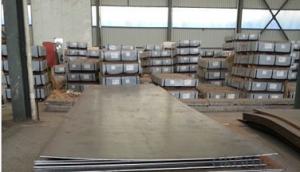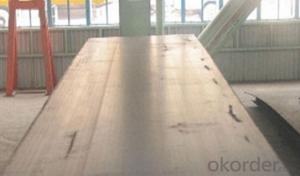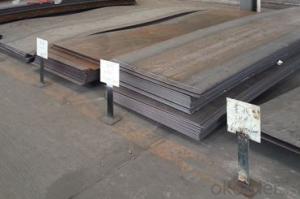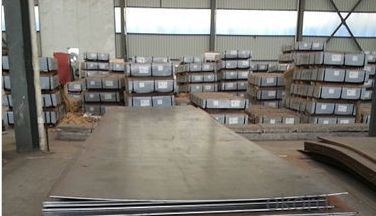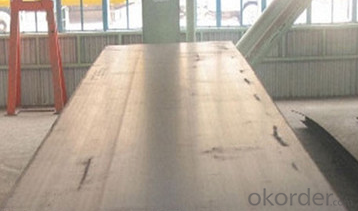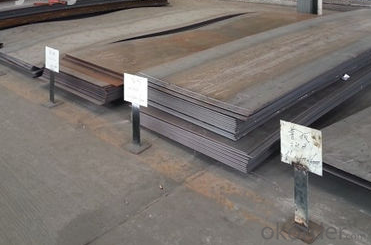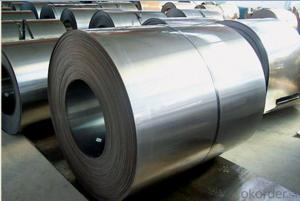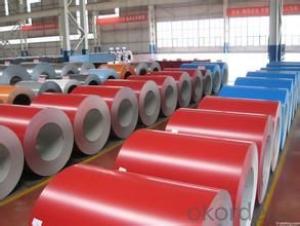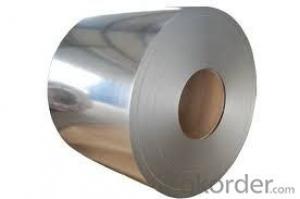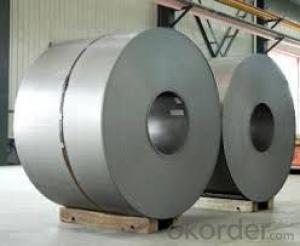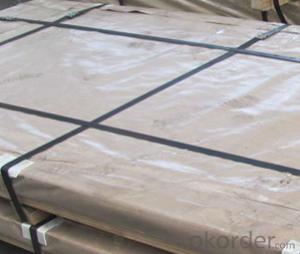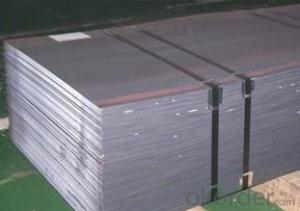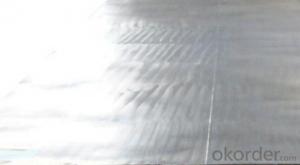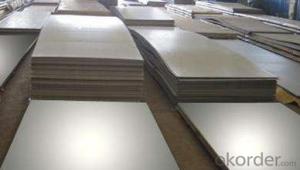Hot Rolled Carbon Steel Sheet A633 CNBM
- Loading Port:
- Qingdao
- Payment Terms:
- TT OR LC
- Min Order Qty:
- 10 pc
- Supply Capability:
- 30 pc/month
OKorder Service Pledge
Quality Product, Order Online Tracking, Timely Delivery
OKorder Financial Service
Credit Rating, Credit Services, Credit Purchasing
You Might Also Like
Quick Details
| Standard: | AISI, ASTM, DIN, GB, JIS | Grade: | A572,A573,A633,A678,A709,A710,G3101,G3136,etc | Thickness: | 1mm-200mm |
| Brand Name: | SHOU GANG GROUP, AN STEEL | Model Number: | Q235 | ||
| Type: | Steel Plate | Technique: | Hot Rolled | Surface Treatment: | Coated |
| Application: | widely | Special Use: | High-strength Steel Plate | Width: | 1000mm-3000mm |
| Length: | 1000mm-12000mm | Price Term: | FOB CIF CFR |
Packaging & Delivery
| Packaging Details: | standard seaworthy export packing or as the request of customers |
| Delivery Detail: | 10 days after deposit or according to customers' quantity |
Specifications
hot rolled carbon steel sheet
1.Thickness:1mm-200mm
2.Length:1000mm-12000mm
3.Width:1000mm-2000mm
hot rolled carbon steel sheet
| Product | HR steel plate prices carbon steel plate prices per kg |
| MOQ | 25 ton |
| Thickness | 1mm-200mm |
| Width | 1000mm-3000mm |
| Length | 1000mm-12000mm |
| Application | widely |
| Standard | AISI,ASTM,BS,DIN,JIS,GB,etc |
| Grade | A572,A573,A633,A678,A709,A710,G3101,G3136,etc |
| Tpye | Steel plate |
| Surfacing | Coated |
| Productive Technology | Hot Rolled & Cold Rolled |
| Port | |
| Payment Terms | L/C,T/T,Western Union,MoneyGram |
| Product Ability | 5000 tons per month |
| Delivery | 10 days after deposit or according to customers' quantity |
| Packing | standard seaworthy export packing or as the request of customers |
- Q: Can steel sheets be recycled without losing their properties?
- Yes, steel sheets can be recycled without losing their properties. Steel is a highly recyclable material, and the recycling process does not compromise its strength, durability, or other properties. Recycling steel sheets helps conserve natural resources and reduce environmental impact.
- Q: What are the insulation properties of steel sheets?
- Compared to other commonly used insulation materials like fiberglass or foam, steel sheets have relatively poor insulation properties. This is because steel is an excellent conductor of heat and electricity, possessing high thermal conductivity. Consequently, steel sheets are ineffective in preventing heat transfer and are not typically used as standalone insulation materials. Nonetheless, steel sheets can still offer some insulation benefits when utilized alongside other insulating materials. For example, they can serve as a protective layer or cladding, enhancing the durability and fire resistance of insulation systems. Additionally, they can function as a radiant barrier, redirecting heat away from buildings and reducing heat gain in warm climates. To summarize, although steel sheets themselves do not possess exceptional insulation properties, they can contribute to improving overall insulation performance when combined with other insulating materials or applied in specific scenarios such as radiant barriers.
- Q: Can the steel sheets be easily drilled for fastening purposes?
- Drilling steel sheets for fastening purposes? Absolutely possible! Steel is renowned for its strength and durability, yet it remains relatively easy to work with when it comes to drilling. By employing the correct tools and techniques, you can effortlessly create holes in steel sheets to attach brackets, screws, or nails. Nevertheless, it's crucial to employ drill bits specifically designed for metal drilling. Moreover, during the drilling process, it might be necessary to utilize lubricants or cooling agents to prevent overheating and potential damage to the drill bit. Although drilling through steel sheets demands additional effort and careful handling, rest assured, it can be accomplished successfully for fastening purposes.
- Q: Can steel sheets be used for automotive applications?
- Yes, steel sheets are commonly used for automotive applications due to their strength, durability, and cost-effectiveness. They are used in various parts of vehicles such as body panels, structural components, chassis, and engine components. Steel sheets offer excellent crash resistance, corrosion resistance, and can be easily formed and fabricated into complex shapes, making them a suitable choice for automotive manufacturing.
- Q: Can steel sheets be used for agricultural applications?
- Yes, steel sheets can be used for agricultural applications. They are commonly used for building structures such as barns, sheds, and storage units, as well as for fencing and livestock enclosures. Steel sheets provide strength, durability, and protection against weather conditions, making them suitable for various agricultural purposes.
- Q: Can steel sheets be bent or formed?
- Yes, steel sheets can be bent or formed using various techniques such as press brakes, rollers, or specialized machinery. The flexibility and malleability of steel allow it to be shaped into various forms, making it a versatile material for construction and manufacturing purposes.
- Q: Can steel sheets be used for electrical enclosures?
- Yes, steel sheets can be used for electrical enclosures. Steel is a commonly used material due to its durability, strength, and ability to provide electromagnetic shielding. It is suitable for protecting electrical components from external factors such as moisture, dust, and impact while also providing a safe and secure environment for the electrical equipment.
- Q: What are the different sheet metal welding techniques for steel sheets?
- Steel sheets can be joined using various sheet metal welding techniques. The most commonly used methods are as follows: 1. MIG welding, also known as Gas Metal Arc Welding (GMAW), involves the use of a continuous wire electrode to create an arc and join the steel sheets. This technique is versatile and efficient, suitable for both thin and thick sheets. 2. TIG welding, or Gas Tungsten Arc Welding (GTAW), utilizes a non-consumable tungsten electrode to create an arc and join the steel sheets. It produces high-quality welds with excellent control, making it ideal for thin or delicate sheet metal. 3. Resistance Spot Welding (RSW) involves applying pressure and passing a high electrical current through the steel sheets using two electrodes. This causes the sheets to fuse together swiftly and cost-effectively. It is commonly used in the automotive and manufacturing industries. 4. Laser Welding employs a high-energy laser beam to melt and join the steel sheets. The technique offers precise control, high welding speeds, and minimal heat input, making it suitable for thin and highly reflective materials. 5. Electron Beam Welding (EBW) utilizes a focused beam of high-velocity electrons to create a weld. It offers deep penetration and is often used for thick steel sheets or applications requiring high-quality welds. 6. Plasma Arc Welding (PAW) is similar to TIG welding but utilizes a plasma arc to create a weld. This technique provides higher welding speeds and can be used for both thick and thin steel sheets. The choice of welding technique depends on various factors such as the thickness of the steel sheets, desired weld quality, production volume, and available equipment. Each method has its own advantages and limitations.
- Q: How are steel sheets protected against rusting?
- Steel sheets are protected against rusting through a process called corrosion protection. There are several methods used to protect steel sheets from rust, including: 1. Galvanization: This process involves coating the steel sheets with a layer of zinc. Zinc acts as a sacrificial anode, meaning it corrodes in place of the steel when exposed to moisture or oxygen. This creates a barrier that protects the steel from rusting. 2. Painting: Applying a layer of paint to steel sheets acts as a protective barrier against moisture and oxygen. The paint creates a physical barrier that prevents these elements from coming into contact with the steel, thus reducing the risk of rust formation. 3. Powder coating: Powder coating involves applying a dry powder to the steel sheets and then heating it to form a protective layer. The powder melts and fuses into a smooth coating, providing excellent resistance to rust and corrosion. 4. Electroplating: This method involves immersing the steel sheets in a bath containing a metal coating solution, such as zinc or chromium. An electric current is then passed through the bath, causing the metal coating to bond with the steel. This electroplated layer acts as a protective barrier against rust. 5. Phosphating: Phosphating is a chemical process where a layer of zinc or manganese phosphate is deposited on the steel sheets. This layer enhances the adhesion of paint or other coatings, providing a corrosion-resistant surface. These methods are commonly used in various industries to protect steel sheets from rusting. The specific method chosen depends on factors such as cost, durability requirements, and the environment in which the steel sheets will be used.
- Q: Are steel sheets resistant to corrosion?
- Yes, steel sheets are generally resistant to corrosion due to the protective layer formed by the presence of chromium.
Send your message to us
Hot Rolled Carbon Steel Sheet A633 CNBM
- Loading Port:
- Qingdao
- Payment Terms:
- TT OR LC
- Min Order Qty:
- 10 pc
- Supply Capability:
- 30 pc/month
OKorder Service Pledge
Quality Product, Order Online Tracking, Timely Delivery
OKorder Financial Service
Credit Rating, Credit Services, Credit Purchasing
Similar products
Hot products
Hot Searches
Related keywords
